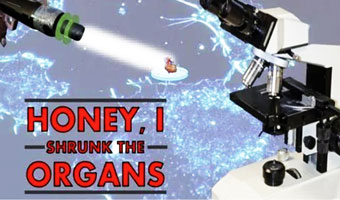
With the chance that any one of us could acquire Alzheimer’s disease doubling every five years after age 60, Prof. Tamir Ben-Hur, head of the Division of Clinical Neurosciences at the Hadassah Medical Organization, views the illness as an epidemic that is crying out for a solution.
Prof. Ben-Hur cautions that by “solution” he means preventing or postponing the onset of the disease, since a cure is still quite far off. He and other researchers around the globe, however, are investigating possible solutions, and there have been some promising developments.
One therapeutic method is to enhance the protective powers of stem cells by manipulating them so that they function better and continue to do the job for which they were intended. As Prof. Ben-Hur notes, five percent of the brain’s cells are stem cells, the basic building blocks of life. “That is a lot,” he says. “What are they doing there?” The brain is not developing anymore and yet they are still there.
Prof. Ben-Hur and his colleagues hypothesized that these stems cells have a therapeutic function persisting through adulthood. And, indeed, his laboratory at Hadassah was the first to reveal many years ago that stem cells heal injuries in the brain by reducing inflammation. Furthermore, when specific stem cells called neural precursor cells (NPCs) were transplanted into the mouse brain, they proved to support growth and survival of the brain’s neurons.
More recently, Prof. Ben-Hur’s research team at Hadassah found in a pre-clinical study with mice that these brain stem cells may protect against Alzheimer’s in some cases. As he reports, the study revealed that when they removed the resident stem cells from the mice who carried human genes which cause familial Alzheimer’s disease and examined them in culture, they found them to be dysfunctional. Specifically, they grew more slowly than normal and lost their ability to inhibit inflammatory cells and support neighboring neurons. In addition, they lost their capacity to support repair processes after injury to the brain.
So what goes wrong as people age? Prof. Ben-Hur explains that these NPCs become dysfunctional. Moreover, he hypothesizes that it is the environment in the brain that induces this dysfunction—an environment that may lead to Alzheimer’s, the most common form of dementia.
Do genes play a role? Prof. Ben-Hur reports that most cases of Alzheimer’s do not have a hereditary genetic component. While genetic makeup puts us all at higher risk for one thing or another, the presence of certain gene patterns may indeed increase the overall risk for Alzheimer’s but does not definitively cause Alzheimer’s.
One challenge we face in preventing or postponing the onset of Alzheimer’s is our lack of inexpensive techniques (also called “biomarkers”) that can alert us to the fact that the brain’s environment is at risk. We do have imaging techniques that will reveal the accumulation of specific proteins in the brain, such as the amyloid or tau proteins, which indicates the potential problem. But because these techniques are very expensive, it is not feasible to provide imaging for everyone as they get older. What we need, Prof. Ben-Hur emphasizes, is a simple screening tool that will alert us to a detrimental shift in the brain’s environment. Once we have the ability to diagnose the threat of Alzheimer’s before symptoms appear, we will be in a better position to conduct clinical trials with drugs that show potential to reverse or halt any progression of the brain’s degeneration.
In the meantime, Prof. Ben-Hur relates that “with what we know already today, we can protect ourselves to a significant degree from developing Alzheimer’s disease.” There are healthy lifestyle options people can choose to reduce their risk—healthy eating, regular physical and mental exercise, and healthy sleep, for example. As Prof. Ben-Hur explains, the same factors that put us at risk for heart attack or stroke—high blood pressure, high cholesterol, diabetes, and smoking—put us at risk also for Alzheimer’s and need to be taken care of. In addition, thanks to Hadassah neurologist Ruth Gabizon and Hebrew University’s Prof. Shlomo Magdassi, who discovered that a special formulation of pomegranate seed oil can reduce the risk of neurodegenerative disease in mice, there is now a supplement on the market that contains a high concentration of the antioxidant, punicic acid, which people can take as a protective measure.
Nevertheless, as Prof. Ben-Hur reports, at this point in time, statistics show that 40 to 50 percent of those over age 85 will get Alzheimer’s disease. “Within two decades,” he projects, “no society will be able to pay the cost of this disease.” Still, he remains optimistic that in the next decade or two, there will be a way to prevent or postpone the development of Alzheimer’s. “In my lifetime,” Prof. Ben-Hur says, “there will be a disease-modifying treatment.”
The answer may lie with our stem cells, the basic building block of our brains, as well as in other exciting approaches.
Learn more about the Hadassah Medical Organization.









